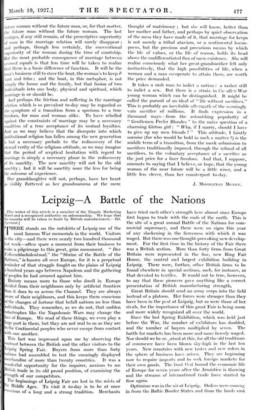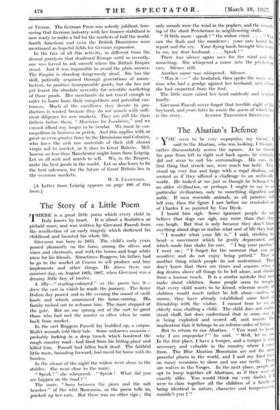Leipzig—A Battle of the Nations
[Tire writer of this article is a member of the Empire Marketing Board and a recognized authority on salesmanship. We hope that his remarks will be taken to heart by British manufacturers.—Ed. .Sretator.] rrIIERE stands on the outskirts of Leipzig one of the most famous War memorials in the world. Visitors o the city—and there were nearly two hundred thousand ast week—often spare a moment from their business to cake a pilgrimage to this great, grim monument. " Das Villkerschlachidenkmal," the "Shrine of the Battle of the Tations," is known all over Europe, for it is a perpetual minder of that struggle fought on the plains of Leipzig hundred years ago between Napoleon and the gathering peoples he had aroused against him.
History means more to those who dwell in Europe hided from their neighbours only by artificial frontiers han it. does to us across the Channel. They are always aware of their neighbours, and this keeps them conscious f the changes of fortune that befall nations no less than ndividuals. They remember, as we do not, that sudden atastrophes like the Napoleonic Wars may change the ace of Europe. We read of these things, we even play a arge part in them, but they are not real to us as they are o the Continental peoples who never escape from contact pith one another.
This fact was impressed upon me by observing the .ontrast between the British and the other visitors to the 'pig Spring Fair. Buyers from more than forty ations had assembled to test the cunningly displayed merchandise of more than twenty countries. It was a onderful opportunity for the inquirer, anxious to see ritish trade in its old proud position, of examining the trength of our competitors. The beginnings of Leipzig Fair are lost in the mists of le Middle Ages. To visit it to-day is to be at once nscious of a long and a strong tradition. Merchants have tried each other's strength here almost since Europe first began to trade with the. ends of the earth. This is the site of a great annual Battle of the Nations for com- mercial supremacy, and there were no signs this year of any slackening in the fierceness with which it was waged. But there was one thought-provoking new develop- ment.. For the first time in the history of the Fair there was a British section. More than forty firms from Great Britain were represented in the fine, new Ring Fair House, the central and largest exhibition building in Leipzig. There were, further, other British firms to be found elsewhere in special sections, such, for instance, as that devoted to textiles. It would not be true, however, to say that these pioneers gave anything like a correct presentation of British manufacturing strength.
Great Britain should send an army corps into the field instead of a platoon. Her forces were stronger than they have been in the past at Leipzig, but so were those of her rivals, for the importance of this great Fair is being more and more widely recognized all over the world.
Since the last Spring Exhibition, which was held just before the War, the number of exhibitors has doubled, and the number of buyers multiplied by seven. The battle for markets has been more and more fiercely waged.
Nor should we be su. „wised at this, for all the old traditions of commerce have been blown sky-high in the last ten years. New countries with new tastes and new rulers in the sphere of business have arisen. They arc beginning now to require imports and to seek foreign markets for their own goods. The frost that bound the economic life of Europe for seven years after the Armistice is thawing and the streams of international trade have started to flow again.
Optimism was in the air at. Leipzig. Orders were coming in from the Baltic Border States and from the lands east of Vimma. The German Press was soberly jubilant, fore- seeing that German industry with her finance stabilized is now ready to make a bid for the markets of half the world. South American and even the British Dominions were mentioned as hopeful fields for German expansion.
In the face of all this activity, so different from the dismal paralysis that deadened Europe until so recently, one was forced to ask oneself where the British Empire stood. And it was impossible to avoid the plain answer. The Empire is standing dangerously aloof. She has the skill, patiently acquired through generations of manu- facture, to produce insurpassable goods, but she has not yet learnt the absolute necessity for scientific marketing of those goods. Her merchants do not travel enough in order to learn from their competitors and potential cus- tomers. Much of the excellence they devote to pro- duction is wasted because they do not search with suffi- cient diligence for new markets. They are still like their fathers before them, " Messieurs les Ins-ulaires," and we cannot afford any longer to be insular. We must be cos- mopolitan in business or perish. And this applies with as great or even greater force to the Dominions and Colonies, who have the rich raw materials of their still almost virgin soil to market, as it does to Great Britain. Mel- bourne no less than Manchester might learn from Leipzig. Let us all seek and search to sell. We, in the Empire, make the best goods in the world. Let us also learn to be the best salesmen, for the future of Great Britain lies in the overseas markets.
W. S. CRAWFORD.
[A Letter from Leipzig appears on page 480 of this issue.]































































 Previous page
Previous page